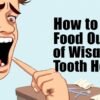Our body has the potential to fight illnesses and recover naturally with the help of a complex immune system. But healing can take longer if the immune system is weak and compromised. Weaker immunity can have many underlying reasons. For instance, higher exposure to pathogens, allergens, and pollutants can over-engage our immune system and slow down healing.
Excessive use of over-the-counter medicines can impair the immune system’s functions. An unhealthy diet and deficiency of essential micronutrients, such as vitamins, antioxidants, and minerals, can also weaken the immune system. Sleep deprivation and dehydration can impede bodily functions, including the immune system, and prolong healing.
But with better awareness regarding healthcare issues and how our body works, we can strengthen our immune system and promote healing. The following sections highlight ways to boost the body’s inherent healing power.
1. Seek proper guidelines from an expert:
Naturopathic doctors, like Dr. Karen Threlkel, are experts in guiding people on how to heal and recuperate by using ways that are unique from conventional medicine. These professionals facilitate and augment the body’s natural healing process by identifying and removing obstacles to health and recovery. Some common therapies involved in the process include diet and lifestyle advice, nutritional and herbal medicine, homeopathy, and tactile therapies, such as massage and acupressure.
Seeing an expert can help you get proper guidance on boosting your body’s natural healing processes and living a healthier lifestyle in general.
2. Avoid exposure to smoking:
Smoking is a life-threatening indulgence. Several studies highlight the lethal consequences of smoking and secondhand exposure to smoke. Cigarettes and other smoking agents contain hundreds of chemicals that impair the functions of almost every internal organ by affecting the lungs’ ability to absorb oxygen. Smoking elevates the risk of respiratory tract issues, cardiovascular ailments, arthritis, diabetes, stroke, malignancies almost everywhere in the body, and premature death.
Toxins and chemicals over-engage our system, affect the body’s ability to absorb essential nutrients, exhaust the immune system, weaken immunity, and slow recovery. So avoid exposure to cigarettes and smoking. Practice strict precautions if you are undergoing rehabilitation for being a nicotine addict.
3. Drink more water:
Moistness, suppleness, and elasticity of skin muscles are visible benefits of more water intake. But water is also necessary for internal body functions. It helps with regulating the tissue fluid balance and temperature. It helps excrete toxins and chemicals, detoxify the blood, balance pH levels, and stabilize blood pressure.
Better hydration dilutes urine and prevents the accumulation of harmful substances in the kidneys, reducing the chances of kidney stones and infections of the urinary tract. Water also facilitates the transport of nutrients and the circulation of immune cells throughout the body, promoting immunity and quick recovery.
Dehydration can impede these vital functions, impair the immune response, and slow healing. Hence, drink more than two liters of water every day. And do not compensate for water intake with alternative drinks like coffee, tea, or fizzy drinks.
4. Maintain quality sleep:
Several studies associate a higher risk of heart health issues, kidney malfunction, insulin resistance, hypertension, obesity, diabetes, stroke, and depression in sleep-deprived adults. This is because a good night’s sleep promotes better immunity and helps the body repair and health itself naturally.
A good sleep routine can prevent health issues and ensure a healthy life. Hence, throw all your tasks aside and prioritize sleep whenever it is bedtime. And a good night’s sleep is non-negotiable if you are fighting healthcare challenges. Hence, try to maintain over eight hours of sleep in your routine.
5. Eat more vegetables and fruits:
Vegetables and fresh fruits are primary sources of essential vitamins, antioxidants, minerals, and dietary fiber. Our body needs all these micronutrients to function well, whereas deficiency of these nutrients can lead to unhealthy outcomes. For instance, vitamin D deficiency slows the body’s immune response, increases the risk of infections and autoimmune diseases, and triggers inflammation. Inflammation keeps the immune system on high alert mode and slows healing.
Deficiencies of minerals and antioxidants also affect the body unhealthily and weaken the immune system. So eat lots of fruits and veggies to replenish essential nutrients. And mix different varieties in your diet, as some fruits and vegetables are rich in vitamins while others are loaded with minerals and antioxidants. Thus eat a mix of different fruits and vegetables to fulfill dietary requirements.
6. Cut down on processed foods:
Processed foods are tasty. Flavorful tastes increase our appetite, and we crave more, but binge eating only fills our tummy without sufficient nutritional value. Processed foods contain higher amounts of additives, preservatives, unhealthy fats, salt, spices, and sugar. Seasonings and added sugar raise their caloric count and reduce nutritional value.
Excessive consumption of processed foods can lead to nutritional deficiency, whereas nutritional deficiency is one of the primary causes of a slower immune response and delayed recovery. Spices, salt, and sugar also trigger an inflammatory response and elevate blood pressure, and both can hamper healing processes.
So cut down on processed foods if you are undergoing a rehabilitation journey. Eat less processed, home-cooked, and healthy foods.
7. Make better use of human connections:
Solace and comfort from a healthy relationship with another person are effective ways to stay positive mentally and physically. Since rehab takes time, anticipating results can be overwhelming. Thus doctors also advise attendants to spend more time with patients, engage them in routine activities, and divert their attention from excessive pondering over their healthcare conditions. We need someone to tell us everything is good. So rely on your loved ones when you are sailing through rough tides.
Even if our dear ones cannot speed up our recovery process, their comforting words can lessen our anxiety. Their company can prevent us from becoming helpless.
Conclusion:
Healing is a complex phenomenon. And without a coordinated response of every internal organ, our body cannot function well and recover naturally. So understand your system and match bits and pieces to trigger a coordinated immune response.










